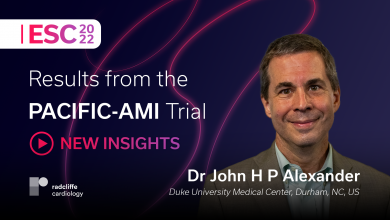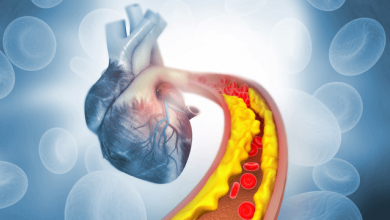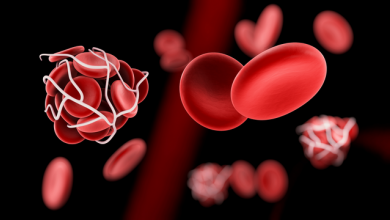Search results
Author(s):
Sasha Koul
,
David Erlinge
Added:
3 years ago
Acute coronary syndromes (ACS) are a major reason for death and morbidity in the industrialised world. One of the most successful treatments for ACS has been strategies to target the platelets and inhibit their function.
Mechanisms of Platelet Activation
Thrombus formation in the arteries is dependent on platelets and their ability to attach to the injured wall despite the rapid arterial blood…
View more
Author(s):
John Alexander
Added:
1 year ago
ESC Congress 22 — Dr John HP Alexander (Duke University Medical Center, US) joins us to share the latest data from the PACIFIC-AMI trial (NCT04304534).
This multicenter, randomized, placebo-controlled, double-blind and dose-finding phase 2 study assessed the efficacy and safety of asundexian (Bayer), an oral FXIa inhibitor on top of a dual antiplatelet therapy (ASA + P2Y12 inhibitor) in…
View more
Author(s):
Raffaele De Caterina
,
Giulia Renda
Added:
3 years ago
Limitations of Coumarin Derivatives in Atrial Fibrillation and the Quest for New Drugs
Warfarin and similar coumarin derivatives (vitamin K antagonists [VKAs]) clearly have the greatest efficacy among the currently available treatments (mostly aspirin) in preventing stroke in atrial fibrillation (AF).1 However, they carry a substantial risk of major bleeding (approximately 1.2% per year) and…
View more
Novel Oral Antiplatelet Agents
Author(s):
Suzanne J Baron
,
Robert P Giugliano
Added:
3 years ago
Article
Author(s):
Diego Penela
,
Maríbel Diaz-Ricart
,
Magda Heras
Added:
3 years ago
The usual underlying mechanism of acute coronary syndromes (ACSs) is a thrombotic event caused by the rupture or erosion of an atherosclerotic plaque. In this scenario, platelets and thrombin are key players. Thus, understanding the physiopathology of platelet activation is of paramount importance in the treatment of acute coronary ischaemia. There is ample evidence showing that adequate…
View more
Author(s):
Jose L Merino
,
José López-Sendón
Added:
3 years ago
Atrial fibrillation (AF) is the most frequent sustained arrhythmia. The estimation is that five million people suffer the disease in Europe,1 although this number may be even higher because many AF episodes are silent but still associated with a risk of complications.2–4 AF prevalence is increasing in developed countries in part due to the progressive increase in the mean age of the western…
View more
Author(s):
Antoni Martínez-Rubio
,
Mario DiazNuila-Alcazar
,
Anna Soria Cadena
,
et al
Added:
3 years ago
Atrial fibrillation (AF) is the most commonly encountered arrhythmia in clinical practice in Western countries. The prevalence of AF depends on the population studied1 and especially on age.2–9 It is affected by increasing longevity and is modulated by the prevalence of cardiovascular risk factors, especially arterial hypertension and related habits. In Spain, for example, the prevalence of AF…
View more
Author(s):
Jack Wei Chieh Tan
,
Derek P Chew
,
Kin Lam Tsui
,
et al
Added:
2 years ago
Author(s):
Julia Sikorska
,
James Uprichard
Added:
3 years ago
For more than 50 years, oral vitamin K antagonists (VKAs) were the choice of anticoagulant for the long-term treatment and prevention of arterial and venous thromboembolic events (VTE). VKA treatment is safe and effective, if a high time in therapeutic range is achieved. However, achieving a stable, therapeutic international normalised ratio can prove challenging in the context of drug and food…
View more
Author(s):
Emmanuel Sorbets
,
Philippe Gabriel Steg
Added:
3 years ago
Despite improvements in the management of coronary artery disease over the last decades, ischaemic heart disease remains the leading cause of mortality worldwide and the leading cause of premature death.1,2 Patients with chronic coronary syndromes (CCS) encompass a heterogeneous population, including those with demonstrable coronary artery disease by anatomical testing or evidence of ischaemia,…
View more












